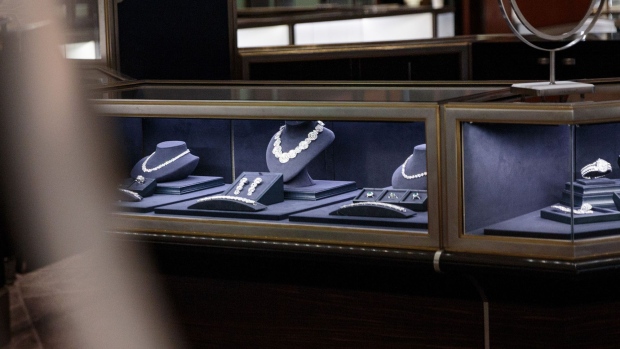Sep 10, 2020
LVMH-Tiffany busted deal is year's biggest to end up in court
, Bloomberg News

Tiffany & Co. is suing to force LVMH to go through with its US$16 billion acquisition, while LVMH said Thursday it would sue Tiffany to get out of it, in the latest broken deal to wind up in court.
At least eight major cases including Tiffany are pending in Delaware Chancery Court, the premier venue for U.S. business litigation. The coronavirus pandemic has added to the list of what can go wrong in a transaction, leaving jilted partners such as Tiffany with nothing to lose by suing. These disputes typically focus on what conditions would allow a buyer to exit a deal -- many of the current litigants are saying the pandemic qualifies.
Lawsuits in the Delaware court encompassed about US$30 billion in failed deals with Tiffany and LVMH being the largest this year.
Overall, deals for U.S. companies totaling US$94 billion have been terminated this year, according to data compiled by Bloomberg.
Disputes involving those failed deals have also landed in other courts. In Michigan, Simon Property Group Inc. and Taubman Centers Inc. are suing each other after Simon walked away from its US$3.6 billion takeover.
It’s only in rare cases where the courts have forced a company to go forward with a deal. One of the few was in 2001, when then Delaware Chancery Court Judge Leo Strine Jr. ruled that IBP Inc. hadn’t concealed financial information and that Tyson Foods Inc. had to complete its US$4.7 billion acquisition at the agreed-upon price.
In another case, a chancery judge in 2017 barred Cigna Corp. from scuttling its US$48 billion merger with Anthem Inc., though the U.S. Justice Department later blocked that deal on antitrust grounds and the two sides returned to the Delaware court to fight over termination fees.
Even if they don’t win, plaintiffs in such cases can pick up some leverage in negotiating a settlement or a better outcome. Some analysts and investors are holding out hope Tiffany can reach a new deal with LVMH, for example.
In a case that could bear on Tiffany’s claims, a court allowed generic drugmaker Fresenius Se in 2018 to ditch its US$4.3 billion acquisition of U.S. rival Akorn Inc. The case was the first in which a Delaware judge clearly found that a deterioration in business qualified as a so-called material adverse event. That deterioration was tied to an attempt by Akorn to cover up operational problems in hopes of ramming the deal through.
That type of legal claim -- now typically citing the effects of the pandemic -- is central to many of this year’s busted-merger cases.
Here are some of the broken-deal cases currently pending in Delaware Chancery Court:
- Dajia v. Mirae Global -- Deal Value: US$5.8 billion. In a case awaiting a judge’s ruling after a trial, China’s Dajia seeks to block Mirae from abandoning the purchase of luxury hotels over alleged fraud. The judge is also examining whether the bookings plunge in the pandemic allows Mirae to scrap the deal.
- The We Company v. SoftBank Group -- Deal Value: US$3 billion. SoftBank is being sued to complete the purchase of a US$3 billion stake after it said WeWork hadn’t met conditions for the transaction.
- Juweel Investors v. Carlyle Roundtrip -- Deal Value: US$1 billion. Carlyle Group and GIC Pte. were sued and then they countersued over decision to back out of a deal for a 20 per cent stake in the American Express Global Business Travel unit.
- Snow Phipps v. KCAKE Acquisition -- Deal Value: US$550 million. Kohlberg & Co. sued to be left off the hook after backing out of a deal to buy the cake decorations wholesaler, saying the business had “cratered” in the pandemic.
- Gilat v. Comtech -- Deal Value: US$532 million. Satellite technology company Comtech has said it may back out of deal to acquire a competitor because the pandemic has dented Gilat’s business. A trial is set to start Oct. 5.
- Level 4 Yoga v. CorePower Yoga -- Deal Value: US$23 million. Level 4 says CorePower can’t back out of deal for yoga franchises even with closures of studios because of pandemic.
- Oberman Tivoli & Pickert v. Cast & Crew Indie Services -- Deal Value: Undisclosed. Entertainment payroll company Cast & Crew accused of using the pandemic as a pretext to renege on a merger with a competing firm.
Here are some examples of cases that settled or ended:
- Sycamore Partners sued to cancel its US$525 million deal with L Brands Inc. to buy a controlling stake in the retailer Victoria’s Secret. L Brands countersued and the two sides reached a settlement in May with neither paying a breakup fee to the other, according to a statement at the time.
- Forescout Technologies Inc. sued Advent International in May, arguing against the private equity firm’s claims that the pandemic allowed it to break their US$1.9 billion deal. The two agreed in July to dismiss the case and move ahead with the deal, though at a discount.
- Rohm & Haas Co. sued Dow Chemical Co. in 2009 in Delaware to force the completion of the chemicals mega-merger. In the end, the deal was rescued after both sides agreed to new terms the weekend before the trial date.





